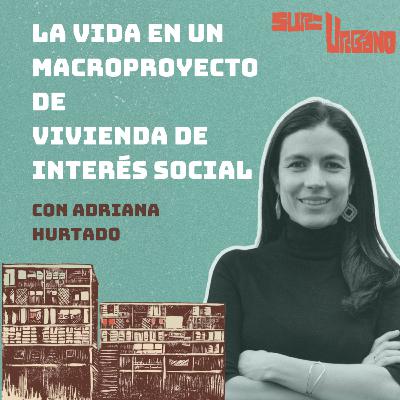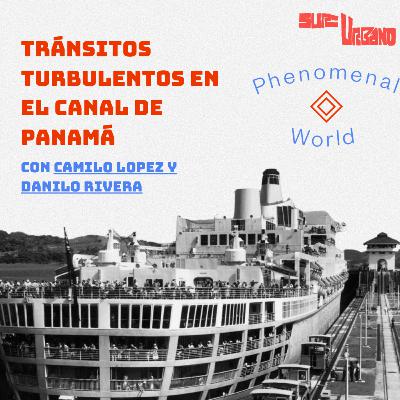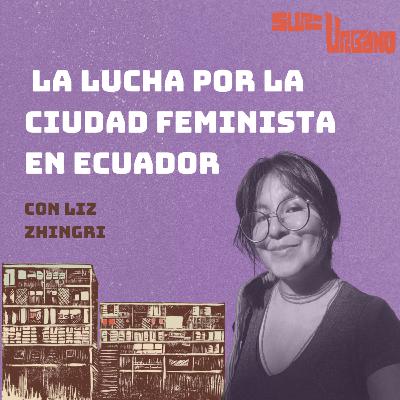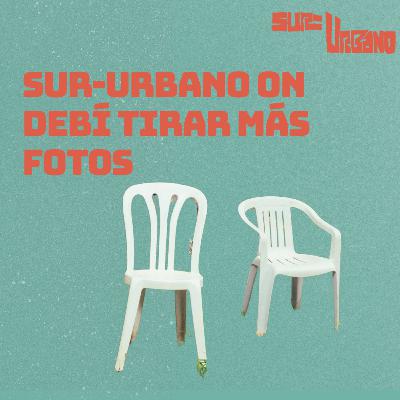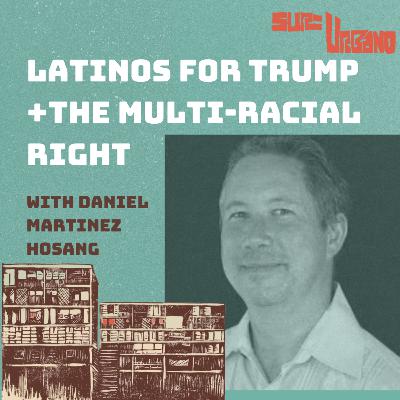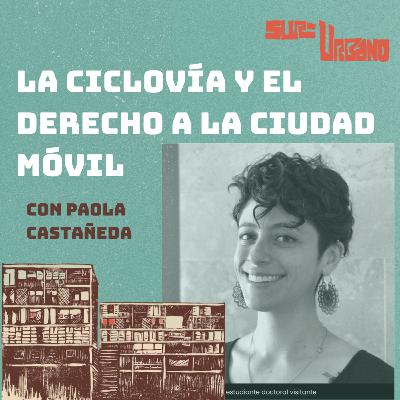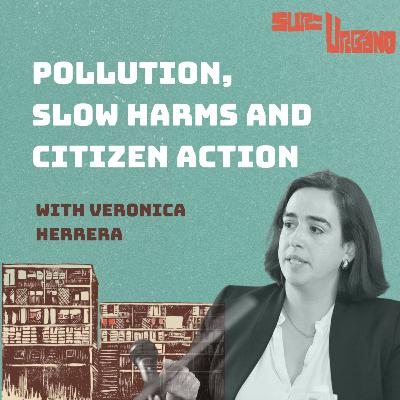Discover Sur-Urbano
Sur-Urbano

Sur-Urbano
Author: Latin American Cities Working Group
Subscribed: 11Played: 42Subscribe
Share
© Latin American Cities Working Group
Description
“Sur-urbano” is a podcast where we talk to leading scholars, planners and activists on Latin American cities about their work, the cities they love and how to make them better.
Produced by the Latin American Cities Working Group, based at UC - Berkeley, and hosted by Isabel Peñaranda Currie. To find out more, or to cohost, reach us at @latam_cities.
Made possible thanks to UC Berkeley’s Global Metropolitan Studies and to the Center of Latin American Studies.
Music: Jaime Alejandro Angarita
Art: Rachel Meirs - https://www.instagram.com/rachel.meirs/
Production: Francesca Fenzi
Produced by the Latin American Cities Working Group, based at UC - Berkeley, and hosted by Isabel Peñaranda Currie. To find out more, or to cohost, reach us at @latam_cities.
Made possible thanks to UC Berkeley’s Global Metropolitan Studies and to the Center of Latin American Studies.
Music: Jaime Alejandro Angarita
Art: Rachel Meirs - https://www.instagram.com/rachel.meirs/
Production: Francesca Fenzi
52 Episodes
Reverse
En América Latina heredamos el impulso de hacer ciudades “desde cero”: desde la damera colonial a Brasilia, cada época y lugar, interpreta este impulso de borrón y cuenta nueva a su propia manera. En el siglo XXI, en la capital de Colombia, ese sueño tomó forma en Ciudad Verde, una ciudadela de 49.500 viviendas construida en Soacha, al sur de Bogotá. Concebida como parte de la política de vivienda llamada "macroproyectos de vivienda de interés social" a nivel nacional, el proyecto reunió distintos tipos de vivienda —100 % subsidiada, VIP, VIS y algunas de rangos más altos— para hogares entre uno y más de cuatro salarios mínimos.Fue desarrollada por una constructora privada en suelo barato de periferia, y sus apartamentos fueron vendidos rápidamente gracias a subsidios de vivienda. Su visión de la unión entre el estado y las inmobiliarias prometía, como toda buena nueva ciudad, un nuevo imaginario: el de una nueva clase media.Pero que pasa después cuando se materializa esa nueva vivienda periférica con reglas de propiedad horizontal y largos viajes al trabajo y colegio? Y cómo podemos, a partir de entender cotidianidad, evaluar el impacto de esta política de vivienda? De eso trata el artículo "Habitando Ciudad Verde: Experiencias de los residentes de un macroproyecto de vivienda de interés social (Soacha, Colombia)" de Adriana Hurtado Tarazona y nuestro episodio de Sur-Urbano. A partir de su investigación etnográfica, Adrian explora las cotidianidades de Ciudad Verde: las relaciones entre vecinos, la misma decoración de los apartamentos, la vivienda para el uso y la inversión, y la navegación de la vida colectiva e individual.Adriana Hurtado Tarazona, profesora asociada y ✨ directora 💫 del Centro Interdisciplinario de Estudios sobre Desarrollo (Cider) - Uniandes. Adriana, con una maestría en planeación y un doctorado en antropología, combina ambas miradas para estudiar vivienda social, renovación urbana, infraestructuras cotidianas y del cuidado, entre muchos otros temas.Me acompañó com cohost Ana María Pérez. Ana María es politóloga, profesional en lenguajes y estudios socioculturales, magíster en City Planning del MIT, ha trabajado con Amarilo recomendando acciones para el futuro de Ciudad Verde —precisamente— y actualmente trabaja con la Secretaría del Hábitat de Bogotá.
En su discurso de investidura, el presidente de los Estados Unidos Donald Trump declaró: “China está operando el Canal de Panamá. No se lo dimos a China, se lo dimos a Panamá, y lo vamos a recuperar”. Desde entonces, ha repetido que va a “recuperar” el canal, así demostrando que su mantra de Make America Great Again requiere resucitar el imaginario de la época dorada del expansionismo gringo, cuando Panama - y tantas otras partes del mundo - eran enclaves neocoloniales.En este contexto, nos pareció importante discutir la verdadera historia del canal de Panamá en el marco del modelo de desarrollo de este país, y por supuesto, sus ciudades. Y para ello, nos juntamos con Phenomenal World para discutir el artículo: "Tránsitos turbulentos: El Canal de Panamá bajo mando nacional" de Camilo Lopez y Danilo Rivera. Lo pueden consultar aquí: https://www.phenomenalworld.org/es/analisis/transitos-turbulentos/Por si no los conocen ya: Phenomenal World es una publicación enfocada en economía política que publica en español, ingles y portugués artículos rigurosos sobre la economía, ciencias políticas, historia, finanzas y política pública.Para mi fue muy importante entender cómo los hilos del imperialismo han estado tejidos desde el principio de la historia de Panamá, y a su vez, de cómo las restricciones a la soberanía panameña aumentaron su dependencia sobre el capital financiero y la especulación inmobiliaria. Hay una extraña conexión entre el hecho de que la mitad de los pagos iniciales para el canal se hicieron en inversiones de JP morgan en finca raíz en Nueva york, y ahora, es precisamente un promotor inmobiliario Neoyorquino el que busca quitarle el canal a las y los panameños.Nuestros invitados Camilo y Danilo tienen un conocimiento enciclopédico de esta historia que les permite hacer una lectura crítica del presente. Camilo López es investigador en políticas públicas e historia panameña. Danilo Rivera es investigador de políticas sociales y macroeconómicas panameñas. Como siempre, encontrarán su artículo en nuestras notas del episodio.
Un día de Septiembre del 2020, en uno de los puentes del centro histórico colonial de Cuenca, en Ecuador, apareció un graffiti escrito. Leía: Nosotras parimos, nosotras decidimos, en respuesta al veto presidencial al Codigo de Salud, que habíabuscado despenalizar el aborto en todas sus causales. El gobierno local denunció lo que llamó un acto de vandalism, y lo blanquéo, borrando el mensaje. Unos meses después hubo un aumento de femicidos en Ecuador, y 6 mujeres fueron asesinadas en un poco tiempo, la mitad en Cuenca. De nuevo apareció un mensaje en el Puente: Quieren que dejemos de rayar sus muros? FACIL: DEJEN DE MATARNOS Y así se dió una lucha feminista por la reapropiación del espacio público y en contra de la violencia hacia las mujeres. Se logró que se instalara una placa en el Puente; posteriormente fue vandalizada, y las lideresas de estos movimientos amenazadas; hubieron movilizaciones y repression, manoseo politico y logros profundos. La lucha por el “Puente Vivas nos Queremos” da pie para reflexionar sobre la relación entre el género y la ciudad, las huellas coloniales de muchas de nuestrasciudades, y el espacio público como objeto de luchas políticas y memoria colectiva. Para inspirarnos con su lucha y compartir aprendizajes, en este episodio hablamos con dos de las participantes del moviemiento Puente Vivias Nos Queremos. Una es nuestracohost, Domenica Valverde, estudiante de maestría en inovación, Desarrollo Humano y Sostenibilidad en la Universidad de Ginebra. Juntas entrevistamos aLiz Zhingri, activista y comunicadora feminista de Cuenca. El coraje, compromiso y solidaridad de Liz y Domenica fueron el antídoto perfecto para estos tiempos difíciles, y me inspiraron profundamente – espero que sientan lo mismo.
Este es un episodio atípico, y un poquito improvisado. Enél, entrevisto a tres puertoriqueños – Juan Arroyo, Coral Murphy y Ashely Ortiz, quienes son periodistas de música y estudiantes de doctorado en temas afines – para que nos ayuden a entender el album en su contexto. Descubríademás que Sebastián Duque, mi editor y colaborador esencial en este podcast, es un erudito del reggaeton, entonces también lo invite a participar. Juntos analizamos algunas de nuestras canciones favoritas desde la perspectiva musical, política y territorial. Vamos perfilando la crisis existencial en la que se encuentra Puerto Rico, afligido por la herencia del colonialismo y en unaentrecrucijada entre convertirse un estado más de los Estados Unidos, o un movimiento cada más poderoso que busca la independencia. Es, como ha dicho Bad Bunny, su album más Puertoriqueño, pero también más universal. Lo que ha presenciado Sebastián en Cartagena, o yo en Washingon Heights en Nueva York, o los Puerto Riqueños en su isla, es un proceso de despojo de su derecho a la ciudad, a su territorio. Y realmente en este momento, cuantos no sentimos – estemosen Estados Unidos, América Latina, o demás –que los intereses de Sillicon Valley y el gran capital no nos está convertiendo, en cierto sentido, en extraños en nuestra propia tierra? Que el mundo se está forjando para interesas incompatibles con el bienestar de nuestras comunidades? Arrancamos con una conversación con Juan Arroyo, periodista de medios y sobre todo de música que ha escrito para publicaciones como Rolling Stone, Pitchfork y demás.Me acompaña como cohost y partícipe Coral Murphy,colega de doctorado de UC Berkelye, y también periodista para medios como el Guardian y the New York times. Segundo acto, con Sebastián Duque, Cartagenero exiliado aBogotá y editor del podcast. Para finalizar, hablo con Ashley Ortiz Chico, estudiante de Doctorado en Estudios Latinoamericanos en la Universidad de Tulane quien trabaja temas de justicia Ambiental y decolonialidad en Puerto Rico. El trabajo de Ashley centrael trabajo de organizaciones comunitarias que combinan la proteccion de la memoria historica y y cultural con la proteccion ecológica.
Since his inauguration just over a week ago, President Donald Trump has signed 8 executive orders and taken over 21 actions linked to immigration, evoking the notion of an “invasion” to justify a harsh military approach and promising “mass deportations”. Three days ago, his administration’s decision to use military airplanes to deport migrants – often handcuffed and treated like criminals – set off a diplomatic crisis with Colombia. Our president Gustavo Petro refused to accept two military flights with deported Colombians; Trump’s response was a disproportionate and vindictive weaponization of tariffs, which he threatened to raise 50%, and a repeal of all government official visas. Even though Petro ultimately accepted the fights, the fallout continues. Colombia was made an example of, to send the message that anyone that responds to Trump with anything other than complete submission – both inside and outside the US - will be aggressively punished.
And yet in perhaps the most racist and overtly imperialist
expression of the Republican party, Trump won with a significant increase of the Latino vote. The inspiration for this episode of Sur-Urbano was the shift towards the right in predominantly latino cities in the US. Miami-Dade county, which is 70% latino, swung republican for the first time since 1988. In counties all over the US-Mexico border - which tend to be majority or have large latino populations - the Trump vote grew by 10 to 25%, even in cases where Trump lost.
This even happened in blue states and cities; in California, the largely latino Central Valley supported trump, and even in Queens and the Bronx in New York, the Trump vote increased by around 20%.
It is more important than ever to understand the unique
power of the multi-racial right.
And for this, I joined forces with cohost and political theorist Will Callinson to interview Prof. Daniel HoSang, professor of American studies at Yale University. Daniel is an interdisciplinary scholar of racial formation and racism in politics, and coeditor of a forthcoming book titled The Politics of the Multiracial Right. I learned so much from this conversation, and am convinced that any hope of resistance must stem from a reckoning within the left, which includes better understanding of what drives voters – particularly the working class and of color – to the right.
Will Callison (williamcallison.bsky.social) is a political theorist and a Lecturer in Social Studies at Harvard University.
Todos los domingos en Bogotá, algo medio mágico pasa. Las
calles que durante la semana se la pasan atestadas de carros – esas que uno
como peatón se arriesga la vida cruzando – de repente se convierten en paraísos ciclistas. Niños, viejitos, señoras en spandex, adolescentes en manadas, todos se toman las calles en ciclas, patines, aeróbicos y más. Este fenómeno – que llamamos la Ciclovía – hace poco cumplió 50 años.
En este episodio inaugural de nuestra sexta temporada,
hablamos con Paola Castañeda, Profesora Asistente en el departamento de
Historia y Geografía de la Universidad de los Andes, y ciclista apsionada.. En
este episodio, hablamos sobre su trabajo sobre el activismo de ciclismo y el
derecho a la ciudad móvil, la historia y futuro de la ciclovía, y cómo el género cruza la movilidad en diversas maneras.
Discutimos los siguientes textos:
From the Right to Mobility to the Right to the Mobile City: Playfulness and
Mobilities in Bogotá's Cycling Activism. https://onlinelibrary.wiley.com/doi/abs/10.1111/anti.12581
Gender and mobility: engaging women’s mobile lives. https://www.researchgate.net/publication/384962658_Gender_and_mobility_engaging_womens_mobile_lives
10 motivos para celebrar medio siglo de la Ciclovía. https://www.lasillavacia.com/red-de-expertos/red-cachaca/10-motivos-para-celebrar-medio-siglo-de-la-ciclovia/
Toxic pollution kills 12.6 million people every year—nearlyone-quarter of all global deaths – and 92% of these deaths occur in middle or low-income countries. Yet despite its deadliness, environmental harms are oftena slow-moving and long-standing problem, which can be difficult to detect and thus “invisible” in some ways which result in inaction and complacency. So what can be done? In her book “Slow Harms and Citizen Action: Environmental Degradation and Policy Change in Latin American Cities”, Professor Veronica Herrera asks: When and how do people mobilize around slow harms? By examining the cases of Buenos Aires, Bogotá and Lima, the book looks at how citizen movements can push the state to implement environmental rights protections, and how ideas about pollution as a policy problem become institutionalized. This episode was hosted by Sebastián Solarte. Sebastián is a PhD Candidate at the UCLA Institute of the Environment and Sustainability. In his research, he uses a political ecology lens to study grassroots movements aiming to overcome energy poverty in rural Colombia. Beyond his work, he is passionate about exploring places with his bicycle and finding new food spots.Veronica Herrera, our guest, is an Associate Professor ofUrban Planning and Political Science in the Luskin School of Public Affairs at the University of California, Los Angeles. I study the political economy of development and environmental politics and policy, with a focus on cities, civil society, and Latin America.
Esto es un desafío al orden establecido, una invitación a transgredir, a romper el cerco. Son historias ordinarias y cotidianas, de amores y desamores, del prójimo y del próximo, de muertos y vivos, de locos y cuerdos, de desacuerdos, de un país en cantos y del desencanto, de las visitas al baño y de la oveja negra que perdió el rebaño, del macharrán y del sacristán, del bien y el mal, de los excesos, y del poco seso, de mis desvelos y de un poco de eso.
Hoy en Sur-Urbano, tenemos un episodio un poco diferente. Entrevistamos al cronista puertoriqueño Rafaél Pabón, quien acaba de lanzar un nuevo libro lamado “Surviving a lo Bori”. Como las crónicas del libro, en este episodio hablamos de todo un poquito: de la historia familiar de Rafael en San Juan, de las nostalgias de un boricua en Nueva York, de la música, política y por supuesto, de los mundos urbanos que nos inspiran.
¡Bienvenides a nuestra cuarta temporada de Sur-Urbano!
Arrancamos con un estallido. El 28 de Abril de 2021, se declaró un paro nacional en Colombia como reacción en contra de una controversial reforma fiscal impulsada por el gobierno de Iván Duque en medio de la pandemia. En todo el país, las calles se llenaron de manifestantes, se escuchaba el eco de los cacerolazos, y durante meses fuimos testigos de una impresionante experimentación política de resistencia. Aunque su importancia trascendió lo electoral, tuvo mucho que ver con la elección de Gustavo Petro y Francia Marquez, el primer gobierno de izquierda en la historia de Colombia.
Alejandra Azuero Quijano, nuestra invitada de hoy, es doctora en derecho y antropología y actualmente es profesora en Swarthmore College, Filadelfia. En su libro El Paro como Teoría, nos propone pensar al paro como un “estallido epistémico”, un acontecimiento que tiene la capacidad de cambiarlo todo: la política, las condiciones sensibles y los modos del saber.
Junto con Ana Marrugo Gómez, hablamos con ella sobre qué significa eso de entender al paro como teoría, sobre las temporalidades y espacialidades y sentidos nuevos que el mismo creó y sigue creando, y sobre cómo repensar el pasado para entender y actualizar el presente.
¿Cómo se ve la justicia climática desde lo urbano? En el marco del cambio climático, el acceso al agua es un tema cada vez más apremiante - y la Ciudad de México, es una crisis ya reconocida que se intensifica todos los días. En este episodio Lis Camacho y yo hablamos con Claudia Campero y Jimena Silva sobre su informe La guía Agua y Clima para involucrarte en tu ciudad, publicado por Greenpeace México. Discutimos esa intersección tan compleja entre los retos urbanos, la gestión del agua, y el cambio climático. Sobre todo, vemos cómo las ciudades contribuyen a la crisis climática, pero también son víctimas de ella. Cuando se suma esto a contextos de desigualdad, vemos cómo la crisis climática profundiza la inequidad. En su Guía, Claudia y Jimena nos invitan a informarnos, sí, pero también a actuar.
Claudia Campero y Jimena Silva, expertas profesionales y activistas en temas de sustentabilidad, gestión del agua, cambio climático y transiciones justas. Jimena es activista para el cuidado del agua, el ajolote y la biodiversidad en Xochimilco con la iniciativa del Foro Económico Mundial, dentro de la red Global Shapers del hub CDMX . Claudia Es coordinadora de alianzas de la Iniciativa por del Tratado de No Proliferación de Combustibles Fósiles. Lis, nuestra cohost, es abogada especializada en derecho ambienta y política climática.
Bienvenides a una nueva temporada de Sur-Urbano!
Para hablar de este importante tema quisimos invitar a Hasta
‘Bajo Project, el primer archivo histórico del reggaetón en Puerto Rico. Junto con mi cohost Betsabé Castro, entrevistamos a Ashley o “Ash” Olivia Mayor - co-directra ejecutiva de Hasta Bajo Project, y curadora de música Latina en el Smithsonian, y a Loraine, o “Lola” Rosado Pérez, del equipo del archivo y estudiante doctoral en el Centro de Estudios Avanzados.
Hablamos de los orígenes y evolución del género, desde el dancehall jamaiquino en Panamá, al rap en español en las las calles de nueva York, llegando a Puerto Rico. El reggaeton se convierte en un escenario y lente para entender las dinámicas de clase, raza y género en Puerto Rico durante los últimos 25 años, y paralelamente, cómo esto se manifiesta en el espacio urbano. En el entramado de los barrios populares como la Perla del del viejo san Juan, o en los caseríos de Vivienda social, los primeros artistas de reggaeton – muches de ells negres – forjaron este género para describir sus experiencias. Con Lola y Ash, exploramos cómo el reggaeton se convirtió en objeto de estigma e incluso prohibición a la par que estas comunidades fueron criminalizadas y racializadas a la par que el espacio urbano fue sujeto a la segregación racial y privatización. También exploramos cómo la comercialización del reggaetón tuvo un “blanquamiento” – metafórico, al pasar de retratar la cotidianidad de estas comunidades a temas más comerciales, y también un blanqueamiento literal, ya que el colorismo favoreció a ciertos artistas de rasgos más mestizos y excluyó a muchos de los artistas negres que crearon este género. Culminamos con un mensaje de resistencia, al discutir cómo el reggaeton se está usando como arma de lucha política y de defensa del territorio, incluyendo las luchas por servicios públicos y en contra de la gentrificación.
The question of inequality haunts the global north and south as economic, racial and other forms of inequality appear to grow deeper and to more devastating effects. But although this is a global problem, it is not an inevitable or homogeneous one, and local actors can have a role in responding to this dynamic. That is why in today’s episode we ask: ‘Why are some cities more equal than others?”. To answer this question, Flavia Leite and Isabel Peñaranda talk to Ben Bradlow, an associate research scholar and lecturer at Princeton. Through a south-south comparison of Sao Paulo and Johanseburg, Ben argues that some cities are better at reducing inequality than others because of their degree of embeddedness and cohesion.
Bradlow's book, Urban Power (forthcoming with Princeton University Press) asks “Why are some cities more effective than others at reducing inequality?” To answer this question, he compares the divergent politics of distributing urban public goods — housing, sanitation, and transportation — in two mega-cities after transitions to democracy: Johannesburg, South Africa, and São Paulo, Brazil.
Because the book isn’t out yet, we based our interview on two papers: a 2022 paper in Theory and Society – Embeddedness and cohesion: regimes of urban public goods distribution – and a 2021 paper in City & Community –Weapons of the Strong: Elite Resistance and the Neo-Apartheid City
Ben Bradlow is an Associate Research Scholar in the Department of Sociology at Princeton University and a Lecturer in Princeton’s School of Public and International Affairs. He is trained as both a sociologist and city planner, and holds a PhD in Sociology from Brown University (2020), and a Masters in City Planning from MIT (2013).
Flavia Leite is a PhD student in City & Regional Planning at UC Berkeley. Her research interest revolves around the relationship between formal and informal housing markets, with a specific focus on housing financialization, access to credit, and housing policy in Latin America.
Welcome to the first episode of 2023! In this episode, Giselle Mendonça Abreu and I have the privilege of talking to a scholar well known among those of us who study Latin American cities: Teresa Caldeira. Professor Caldeira's work, rooted in ethnography of Sao Paulo's peripheral urbanization, has made substantial methodological and theoretical contribution to how se study cities, particularly in the Global South, for decades. In this episode, we discuss Teresa’s trajectory as an urban anthropologist in the 1970s in favelas in Sao Paulo. We then move on to talk about what has changed since then by discussing her two latest articles, which explore the twin concepts of “transversality” and “transitoriness”. Departing from the belief in progress of the midcentury, which was implicit in autoconstruction, Teresa takes us to the transitory, fragmented and non-linear dynamics which characterize cities today. Like so much of her work, she asks us to critically reflect on the categories we use, including that of the Global South, and pushes us to think transversally with concepts that “travel” in unexpected ways.
The texts we discuss today can be found here:
“Transitoriness: Emergent Time/Space Formations of Urban Collective Life” (published in Grammars of the Urban Ground, edited by Ash Amin and MIchele Lancione
“Transversal Connections: Seeing Cities from Other Spaces” (published in Catalan in 16 Barris, 1000 Ciutats, edited by Valentín Roma, Teresa Caldeira, Frits Gierstberg
Teresa Caldeira is a professor at the University of California - Berkeley in the Department of City and Regional Planning. Her research, which is rooted in anthropology, looks on the predicaments of urbanization, such as spatial segregation, social discrimination, and the uses of public space in cities of the global south. Her book City of Walls: Crime, Segregation, and Citizenship in São Paulo (University of California Press, 2000), won the Senior Book Prize of the American Ethnological Society in 2001, and presents a comprehensive analysis of the ways in which crime, fear of violence, and disrespect of citizenship rights intertwine with urban transformations to produce a new pattern of urban segregation based on fortified enclaves.
Giselle Mendonça Abreu is is PhD candidate in City & Regional Planning at UC Berkeley. Her research examines the political economy of rapidly-growing “soybean” cities in Brazil’s hinterland.
Bienvenides a un episodio muy especial de Sur-Urbano sobre Puerto Rico. En vez del formato de entrevista que normalmente hacemos, hicimos una mesa redonda para explorar la relación entre el colonialismo, el capitalismo y el cambio climático en la isla. Lo interesante es que, como este es un podcast sobre ciudades, lo hacemos desde el punto de vista de la planificación. En otras palabras, exploramos sobre cómo la historia de Puerto Rico, desde el colonialismo hasta los ajustes estructurales neoliberales, se cristalizaron en las instituciones de planificación en Puerto Rico, y así afectaron la respuesta ante el huracán María y su reconstrucción.
Para ello tenemos dos invitados de lujo. El primero es David Josué Carrasquillo Medrano, quien fue el pasado presidente de la Sociedad Puertorriqueña de Planificación, y lleva años trabajando en temas de ordenamiento – u ordenación, como lo dicen en Puerto Rico - territorial, además de haber trabajando con los Planes de Ordenación Territorial y Planes de REcuerpación de múltiples municipios.
También tenemos a Omar Pérez Figueroa, quien obtuvo su doctorado en la universidad de California Irvine del departamento de planificación urbana y política pública, y es el autor de textos como “La geografía de la crisis del agua: ¿Dónde está Puerto Rico?” y demás que pueden consultar aquí: https://www.omarperez.me/bio
In this episode, returning cohost Aurora Echeverría and I talk to Nora Libertun on her article, “Peripheral Growth in Latin American and Caribbean Metropolis: Gated Communities and Path Dependence”. Nora was great to talk to because she is a practitioner – currently working in the Inter-American Development Bank – but has also taught at numerous universities, including Harvard’s Graduate School of Design. She brings this perspective in this article about how the legacy of core-periphery models within Latin American cities – where peripheries tended to be spaces of informality, poverty and divestment – laid the foundation for a new kind of periphery: that of gated communities. We talk about how the legacy of the relationship between the public and private now reproduces – or may potentially mitigate – inequality, and what policy makers can do to address these urban development patterns.
You can find her paper here: https://www.taylorfrancis.com/chapters/edit/10.4324/9781003132622-16/peripheral-growth-latin-american-caribbean-metropolis-nora-libertun-de-duren
Nora Libertun de Duren is a leading expert on sustainability, social inclusion, and affordable housing in urban areas. She has experience working in multilateral development banks, local government, and academia. Currently, Nora leads the Inter-American Development Bank research and knowledge agenda on cities; and mainstreams gender and diversity issues in urban projects. Previously, she was the Director of Planning and Natural Resources for New York City and has taught urban planning and international development at various universities, including Columbia University and the University of Buenos Aires, and currently teaches at Harvard's Graduate School of Design.
Aurora Echavarria is a PhD student in Urban Planning at the University of California, Los Angeles, where she is a graduate fellow in the Latin American Cities Initiative. Her research centers on the relation between systems of local government finances, property taxation and the dynamics of urban inequality in public good provision. Aurora's dissertation research is supported by the Lincoln Institute of Land Policy's C. Lowell Harriss Dissertation Fellowship.
Second, we are starting Season II with an interview with the University of Sao Paulo's Eduardo Marques and cohosted by Marcela Alonso Ferreira. This was an timely conversation, in that Eduardo’s work examines the conditions and dynamics of redistributive urban policies and their changes in Sao Paulo. Understood broadly, it accounts for how progressive urban agendas become policy, and the conditions for their continuity, disruption or oscillation - a pretty fundamental question for the left. It was a hopeful message laced with fear, since we recorded just days before the October 30 presidential election. Now on the other side of the election, Eduardo and Marcela’s analyses are useful in understanding the significance of Lula’s victory.
Eduardo Marques is a full professor at the Department of Political Science and Director of the Center for Metropolitan Studies at the University of São Paulo. He holds a degree in Civil Engineering (UFRJ, 1987), a specialization in Public Health (Fiocruz, 1988), an MSc in Urban and Regional Planning (UFRJ, 1993) and a Ph.D. in Social Sciences (Unicamp, 1998). He recently published the book “The Politics of Incremental Progressivism Governments, Governances and Urban Policy Changes in São Paulo” (Wiley/SUSC-IJURR, 2021), which I recommend to anyone interested in urban policies in Latin America.
In this episode, we discuss two of Eduardo's recent articles: "Why do local governments produce redistributive urban policies?" and "Continuity and Change of Urban Policies in São Paulo: Resilience, Latency, and Reanimation".
Marcela Alonso Ferreira is PhD candidate in Political Science at the Center for European Studies and Comparative Politics at Sciences Po, Paris interested in urban governance in Latin American cities. Marcela investigates the changes in land regularization policy and politics in São Paulo and Mexico City.
Marcela also mentions a research group called Cities are back in town, a seminar series convening urban scholars from various disciplines to discuss recent publications on cities worldwide. Many seminars are online so if you're interested, write to citiesarebackintown@sciencespo.fr to receive our mailing list.
s.
The significance of Peruvian history on the topic of informality, however, is not restricted to this nation. Some of the most emblematic experts on informality - from John Turner to Hernando de Soto - came out of reflecting on housing in cities like Lima and Arequipa, before their ideas were exported to Latin America and around the world.
Today we talk with University of Technology Sydney researcher Helen Gyger on her book “"Improvised Cities: Architecture, Urbanization, and Innovation in Peru," which was also the topic of her PhD dissertation at Columbia University.
As it turns out, when Helen interviewed John Turner on his experience in Peru, he told her she had to look further back and at the Peruvian architects, politicians and academics who were pioneers in addressing low-cost housing. In this episode, we do just that. Cohost Kelly Ros Mery Jaime and I talk to Helen about three figures whose different approaches continue to define the terms of the debate around housing provision and informality today: Fernando Belaúnde Terry, Pedro G. Beltrán, Adolfo Córdova.
We discuss their visions for architecture and low-cost housing provision in the 1950s, ther impact on how informality and the role of the state was conceived in the developmentalist era, and their continued legacy.
Helen Gyer is a researcher on architecture history at the University of Technology Sydney and previously was a Postdoctoral Researcher at the University of Pennsylvania. She holds a PhD in the history and theory of architecture from Columbia University.
Kelly Ros Mery Jaime is an architect at the National University of Engineering in Peru, researcher and activist on housing issues. She holds a master in urban development planning from Manchester University.
Welcome back everyone to our first episode in English of Sur-Urbano’s season 3. Today we ask, what is the role of architecture and planning in creating the future? And if you could design a city that was just, and equitable, and otherwise reflected your values, what would it look like? Do we even remember how to imagine better futures?
The city we are discussing today is one that was never built, but that was imagined in the hearts and minds of a group of Mexican socialist architects in the 1930s. We talk to Alfonso Fierro about his article on the Proyecto de Ciudad Obrera, a project designed in 1938 by the Unión de Arquitectos Socialistas – the Socialist Architecture Union, or UAS. We discuss the context and development of Ciudad Obrera, and how it imagined a different kind of collective life that was in turn linked to a national industrialization and development policy.
But beyond that, we talk about the importance of Urban Utopias – of why imagining different futures critiques the present by denaturalizing it as the only way to be. In doing so, utopias strengthen our ability to bring other kinds of reality into being.
Alfonso Fierro is Assistant Professor of Mexican and Latin American literature at Northwestern University. His work, as we will see, explore the place of utopian and speculative fabulation practices in Latin American urban landscapes.
This week we are talking to Martim Smolka, the man who has been the director of the Latin American and Caribbean program at the Lincoln Institute of Land Policy since it was made, 27 years ago. This is no minor thing: four of our guests on this podcast have worked or published with the Lincoln Institute, and its impact on Latin American land policy is profound - Martim has truly played an important role in the history of land policy in Latin American cities. In this episode, Flavia Leite and I talk with Martim about the Georgist theoretical underpinnings of progressive land policy, the history of these policies in Latin American cities, and why TIF may well be understood as the “anti-christ” of land value capture.
On the subject of TIF, check out Flavia and Bridget Fisher's critical analysis of the camouflaged risks and costs of TIF in Hudson Yards that we mention in the episode: https://www.sciencedirect.com/science/article/abs/pii/S0264275122001007
Martim is a Brazilian economist, with a Ph.D. in Regional Science from the University of Pennsylvania (1980). He was the director of the Program on Latin America and the Caribbean at the Lincoln Institute of Land Policy for 27 years. At the LILP he developed (and lectured in) many educational programs for high-level public officials, members of academia, NGOs leaders and other professionals throughout Latin America.
Flávia is a PhD student in City & Regional Planning at UC Berkeley. Her research interest revolves around the relationship between formal and informal housing markets, with a specific focus on housing financialization, access to credit, and housing policy in Latin America.
¡Bienvenides a nuestro primer episodio en español! De ahora en adelante alternaremos episodios en español con los de inglés.
Empezamos esta nueva etapa hablando con la abogada, activista y académica Carla Escoffié sobre su libro “ El Derecho a la Vivienda en México: Derechos Homónimos”, explorando cómo se ha concebido y provisionado este derecho en el contexto Mexicano, pero también en América Latina. De ahí pasamos a hablar sobre cómo este derecho se puede realmente defender ante un sistema judicial que favorece la propiedad privada y los intereses económicos poderosos - y por ello hablamos sobre las experiencias de Carla defendiendo este derecho en Yucatán.
Culminamos con el llamado a que los y las planificadoras trabajemos más cercanamente con quienes ejercen el derecho, para juntes construir ciudades más justas y equitativas.
Nuestro co-host esta semana es Alfonso Fierro. Alfonso Fierro es Profesor de Literatura Latinoamericana en Kenyon College, y está terminando su doctorado en la Universidad de California Berkeley, donde estudia utopías urbanas en el trabajo de escritores, arquitectos y planificadores después de la Revolución Mexicana.
https://editorial.tirant.com/co/libro/el-derecho-a-la-vivienda-en-mexico-derechos-homonimos-carla-luisa-escoffie-duarte-9788411131452


